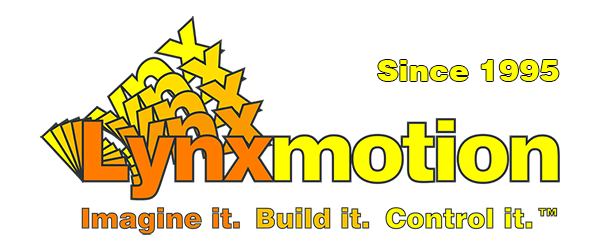Changes for page LSS Communication Protocol
Last modified by Eric Nantel on 2025/06/06 07:47
Summary
-
Page properties (1 modified, 0 added, 0 removed)
Details
- Page properties
-
- Content
-
... ... @@ -433,7 +433,7 @@ 433 433 434 434 __20. First / Initial Position (pulse)__ 435 435 436 -In certain cases, a user might want to have the servo move to a specific angle upon power up. We refer to this as "first position". The factory default has no first position value stored in EEPROM and therefore upon power up, the servo remains limp until a position (or hold command) is assigned. FP and FD are different in that FP is used for RC mode only, whereas FD is used for s erialmode only.436 +In certain cases, a user might want to have the servo move to a specific angle upon power up. We refer to this as "first position". The factory default has no first position value stored in EEPROM and therefore upon power up, the servo remains limp until a position (or hold command) is assigned. FP and FD are different in that FP is used for RC mode only, whereas FD is used for smart mode only. 437 437 438 438 Query First Position in Pulses (**QFP**) 439 439 ... ... @@ -449,7 +449,7 @@ 449 449 450 450 __21. First / Initial Position (Degrees)__ 451 451 452 -In certain cases, a user might want to have the servo move to a specific angle upon power up. We refer to this as "first position". The factory default has no first position value stored in EEPROM and therefore upon power up, the servo remains limp until a position (or hold command) is assigned. FP and FD are different in that FP is used for RC mode only, whereas FD is used for s erialmode only.452 +In certain cases, a user might want to have the servo move to a specific angle upon power up. We refer to this as "first position". The factory default has no first position value stored in EEPROM and therefore upon power up, the servo remains limp until a position (or hold command) is assigned. FP and FD are different in that FP is used for RC mode only, whereas FD is used for smart mode only. 453 453 454 454 Query First Position in Degrees (**QFD**) 455 455 ... ... @@ -461,7 +461,7 @@ 461 461 462 462 Ex: #5CD64<cr> 463 463 464 -This configuration command means the servo, when set to s erialmode, will immediately move to 6.4 degrees upon power up. Sending a CFD command without a number results in the servo remaining limp upon power up.464 +This configuration command means the servo, when set to smart mode, will immediately move to 6.4 degrees upon power up. Sending a CFD command without a number results in the servo remaining limp upon power up. 465 465 466 466 __22. Query Target Position in Degrees (**QDT**)__ 467 467 ... ... @@ -522,10 +522,21 @@ 522 522 523 523 The units are in milliamps, so in the example above, the servo is consuming 140mA, or 0.14A. 524 524 525 -__ 20. RC Mode (**CRC**)__525 +__30. RC Mode (**CRC**)__ 526 526 527 -This command puts the servo into RC mode, where it will only respond to RC pulses. Note that because this is the case, the servo will no longer accept serial commands. The servo can be placed back into s erialmodelonly using the button menu.527 +This command puts the servo into RC mode (position or continuous), where it will only respond to RC pulses. Note that because this is the case, the servo will no longer accept serial commands. The servo can be placed back into smart mode only using the button menu. 528 528 529 +CRC: Add modifier "1" for RC-position mode. 530 +CRC: Add modifier "2" for RC-wheel mode. 531 +Any other value for the modifier results in staying in smart mode. 532 +Puts the servo into RC mode. To revert to smart mode, use the button menu. 533 + 534 +|**Command sent**|**Note** 535 +|ex: #5CRC<cr>|Stay in smart mode. 536 +|ex: #5CRC1<cr>|Change to RC position mode. 537 +|ex: #5CRC2<cr>|Change to RC continuous (wheel) mode. 538 +|ex: #5CRC***<cr>**|Where *** is any number or value. Stay in smart mode.** 539 + 529 529 EX: #5CRC<cr> 530 530 531 531 __**RESET**__

